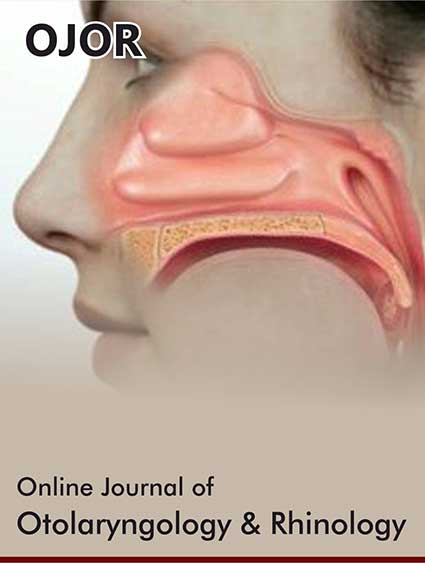 Research Article
Research Article
Creating A Protocol for the Management of Epistaxis in A Tertiary Care Centre-A Practical Application of the British Rhinological Society Multidisciplinary Consensus Recommendations on the Hospital Management of Epistaxis
Matt Lechner1, Oscar Emanuel1, Deepak Chandrasekharan1, Joshua Michaels1, Gulwish Moghul1, Nish Mehta2, Jacklyn Liu2, Claire Hopkins3, Valerie J Lund2, Hassan A Elhassan1, Santdeep Paun1 and Nicholas Eynon Lewis1*
1Department of Otolaryngology-Head and Neck Surgery, Royal London Hospital and Whipps Cross University Hospital, Barts Health NHS Trust, London, UK
2Royal National Throat, Nose and Ear Hospital/Head and Neck Centre, University College London Hospitals NHS Foundation Trust, London, UK
3Guy’s Hospital, Guy’s and St. Thomas’ Hospitals NHS Foundation Trust, London, UK
Mr. Nick Eynon-Lewis, FRCS (ORL-HNS), Department of Otolaryngology-Head and Neck Surgery Royal London Hospital, Barts Health NHS Trust, London, UK.
Received Date: January 03, 2022; Published Date: February 08, 2022
Abstract
Epistaxis is the most common acute presentation to ENT services in the UK. The recent British Rhinological Society multidisciplinary consensus recommendations [1] provide new guidance for its management. To better align with these, we reviewed current practice in our tertiary referral centre. We noted practice variation both within and between departments, particularly concerning the timing and utilisation of nasal packing, accounting for inpatient stay. The aim of this project was to reduce nasal packing for the initial management of epistaxis and increase attempted nasal cautery. We adapted the BRS guidelines for local use and worked with key stakeholders to establish a stepwise management algorithm for epistaxis, which would be suitable for all practitioners to initiate, regardless of specialty. This was discussed in an audit meeting with consultants, registrars, and junior doctors to assess clinical and practical acceptability. After refinement, we produced a step-by-step flowchart, which would serve as the local reference for management of epistaxis. After implementation, our prospective audit showed that inpatient admissions from epistaxis were reduced without adverse events or a significant increase in readmissions. Our QI process and protocol could be used as a safe way to disseminate and implement BRS guidelines at the local level.
Keywords: Epistaxis, Nose bleed, Cautery, Audit, Quality improvement, Acute Care, British Rhinological Society Multidisciplinary Consensus Recommendations on the Hospital Management of Epistaxis
-
Matt Lechner, Oscar Emanuel, Deepak Chandrasekharan, Joshua Michaels, Gulwish Moghul, Nish Mehta, Jacklyn Liu, Claire Hopkins, Valerie J Lund, Hassan A Elhassan, Santdeep Paun, Nicholas Eynon Lewis. Creating A Protocol for the Management of Epistaxis in A Tertiary Care Centre-A Practical Application of the British Rhinological Society Multidisciplinary Consensus Recommendations on the Hospital Management of Epistaxis. On J Otolaryngol & Rhinol. 5(3): 2022. OJOR.MS.ID.000611. DOI: 10.33552/OJOR.2022.05.000611.
-
ENT, Nasal packing, Nasal compression, Otorhinolaryngology, Anterior bleed, ENT SHO’s, ED patients, Radiology, Rhinological society, Acute Care
-

This work is licensed under a Creative Commons Attribution-NonCommercial 4.0 International License.






